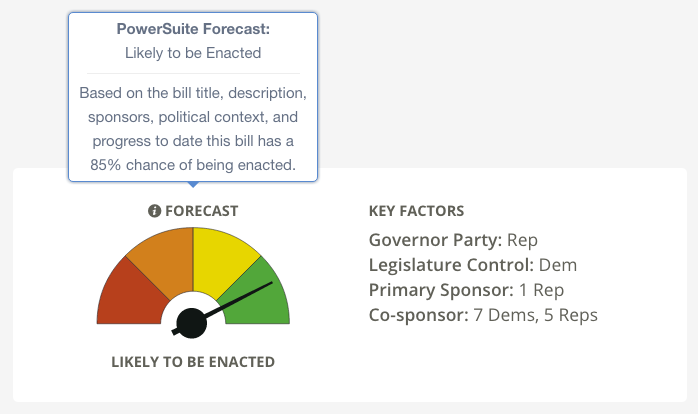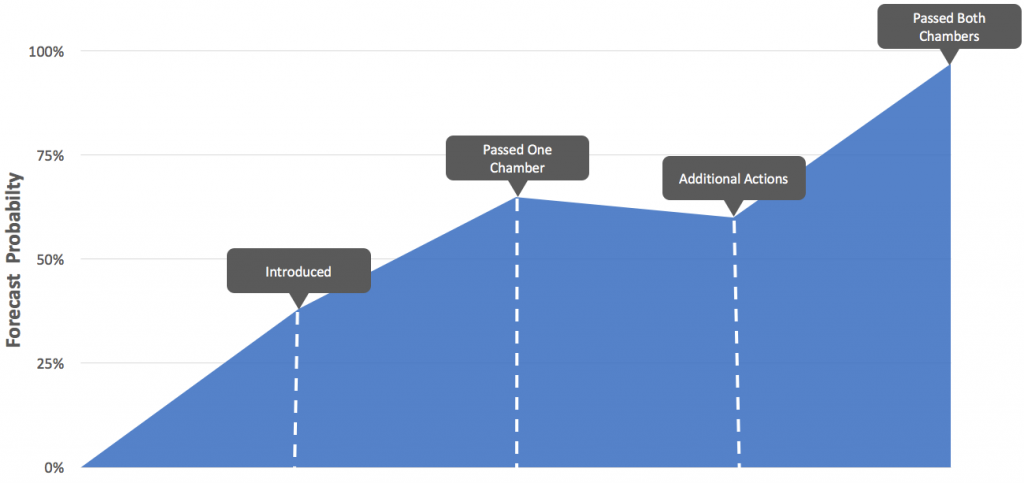REDMOND, Wash., and WASHINGTON — Oct. 6, 2016 — Thursday, Microsoft Corp. and the business group Advanced Energy Economy (AEE) announced a new predictive policy tool to support legislative advocacy in energy. Powered by Microsoft Azure integrated cloud-computing services and machine learning, AEE’s PowerSuite online bill-tracking platform will now enable AEE member companies and state partner organizations to leverage data and analytics in new ways.
The new features build upon AEE PowerSuite’s exclusive database of bills pending in Congress and all 50 states, and assess the probability of a bill’s enactment based on the hundreds of data points either known about the bill when it is introduced, or collected as it moves through the legislative process. With this new tool, users can adjust their strategies to improve the odds of advancing policies that expand markets and remove barriers to competition for advanced energy technologies, products and services.
“This is breakthrough technology for legislative advocacy that moves us to a future of secure, clean, affordable energy,” said Graham Richard, CEO at Advanced Energy Economy. “By combining Microsoft’s cutting-edge Azure machine learning with AEE’s PowerSuite tool and top-notch state legislative staff and partners, we are now more empowered to monitor and engage on advanced energy issues and policy. This strengthens our ability to impact policy.”
“We believe technology can play an important role in accelerating access to renewable energy,” said Rob Bernard, chief environmental strategist at Microsoft. “Tools like PowerSuite provide valuable information and insights that are necessary to advance public policy that expands access to, and the affordability of, advanced energy.”
“This new predictive capability is just scratching the surface of what’s possible,” said Eric Fitz, vice president of engineering and product development at AEE. “In addition to legislative forecasts, we can’t wait to apply machine-learning and natural language processing technologies to our unique database of regulatory data to help make the opaque world of regulatory proceedings more transparent. Stay tuned.”
How AEE’s PowerSuite with Azure works
By identifying and analyzing predictive variables about state legislative activity, including bill topics, sponsors, legislative history and partisan characteristics, PowerSuite can forecast the outcome of state and federal bills with an accuracy of 87 percent based on information available at the time of bill filing, and up to 99.5 percent as legislative action changes the probability of passage over the course of a session.
As soon as a bill is introduced, PowerSuite provides a real-time forecast of its likelihood of being enacted. This helps advocates focus their efforts on bills with the greatest chances of success, and improves the prospects of bills that face an uphill climb. The tool shows bill details, partisan context and forecast at a glance.

The legislative process is not static, and neither are PowerSuite forecasts. As a bill progresses, PowerSuite automatically updates its probability of passage to consider the latest developments, such as passing one chamber, a new amendment, committee referral, new co-sponsors and more. Actions on a bill can either increase or decrease the probability that a bill will be enacted.

PowerSuite’s forecasts are also enhanced by AEE Insights provided by the business group’s team of policy experts, adding human intelligence to machine learning for continuous improvement of the forecasting tool. Their expertise both complements and informs PowerSuite’s bill outcome predictions by providing interpretation and context, strategic guidance, and new data to improve the accuracy of the model over time.
AEE is making the new PowerSuite forecasting tool available to member companies and state partners starting today. It will be offered to non-AEE member PowerSuite paid subscribers at a later date. To sample PowerSuite, sign up for a 30-day free trial.
To get an early look at the bill prediction feature, register here for a sneak peek webinar on Oct. 25.
About Advanced Energy Economy and PowerSuite
Advanced Energy Economy is a national association of businesses that are making the energy we use secure, clean, and affordable. Advanced energy encompasses a broad range of products and services that constitute the best available technologies for meeting energy needs today and tomorrow. AEE’s mission is to transform public policy to enable rapid growth of advanced energy businesses. AEE and its State and Regional Partner organizations are active in 26 states across the country, representing more than 1,000 companies and organizations in the advanced energy industry. AEE’s PowerSuite is the first comprehensive national database of both state and federal legislation and state and federal regulatory dockets, from every state legislature, U.S. Congress, state Public Utilities Commissions (PUC) and the Federal Energy Regulatory Commission (FERC). PowerSuite’s collection of over 500,000 bills and 350,000 dockets, representing 60 million pages of legislative and regulatory text, is equivalent to more than twice the size of the Wikipedia in total data.
About Microsoft
Microsoft (Nasdaq “MSFT” @microsoft) is the leading platform and productivity company for the mobile-first, cloud-first world, and its mission is to empower every person and every organization on the planet to achieve more.
Note to editors: For more information, news and perspectives from Microsoft, please visit the Microsoft News Center at http://news.microsoft.com. Web links, telephone numbers and titles were correct at time of publication, but may have changed. For additional assistance, journalists and analysts may contact Microsoft’s Rapid Response Team or other appropriate contacts listed at https://news.microsoft.com/microsoft-public-relations-contacts.




